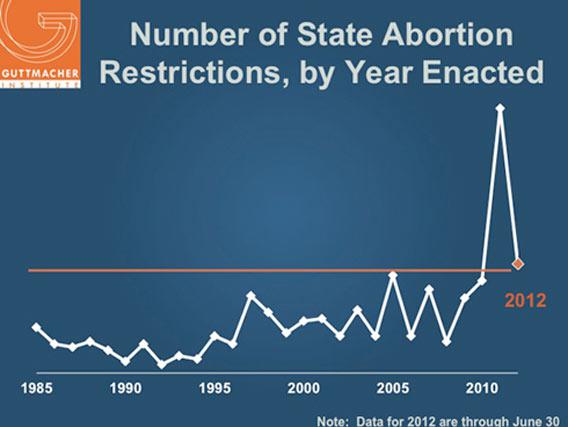The Guttmacher Institute released a midyear report measuring legislative attacks on reproductive health care access, and while the major finding is that the number of new laws passed that restrict abortion rights is way down from last year, it’s still up from pretty much every year prior to 2011 going all the way back to 1985. This year, states have passed 39 new abortion restrictions. Fourteen of those were passed in just three states: Arizona, Louisiana, and South Dakota. Last year at this time, states had passed 80 new abortion restrictions. Attempts from conservatives to argue that feminist activists are just hysterically making up the “war on women” should be regarded, in light of the above chart, with the same esteem one offers to someone ranting about how they’re picking up alien transmissions through their fillings.
The most obvious explanation for the drop in new abortion restrictions is good ol’ regression to the mean; the attacks on women’s rights were so out of control in 2011 that keeping up the pace in 2012 was probably impossible for Republicans. The Guttmacher report suggests a couple of factors that played into this rapid decline. Election year legislative sessions tend to be shorter, giving Republicans less time to work out their vagina obsession. In addition, the amount of negative attention that the attacks on women’s rights have drawn has put a damper on all the fun. It’s quickly becoming axiomatic that the longer a debate over reproductive rights goes on, the probability that a male legislator is going to have a hissy fit over the word vagina approaches 1. (You’re free to call that “Marcotte’s Law.”) Having grown men reach for the smelling salts because someone named the horrible monster-organ they’re trying to control never plays well in the press, and politicians, by their nature, tend to be a bit sensitive about that.
The chance of the legislatures passing a whole bunch more laws this year is pretty low. Only seven out of the 44 state legislatures that held sessions this year are still in session. Future legislative assaults on reproductive rights will probably depend on a lot of factors, but especially on how the existing new regulations play out in court. This trend of declining interest in regulating abortion out of existence could quickly be turned around if Mississippi is successful in defending a law clearly drafted for no other purpose than to functionally ban abortion in that state. That kind of court victory could set off a new frenzy of abortion regulations, especially if Republicans maintain so much power at the state level after the 2012 election.
